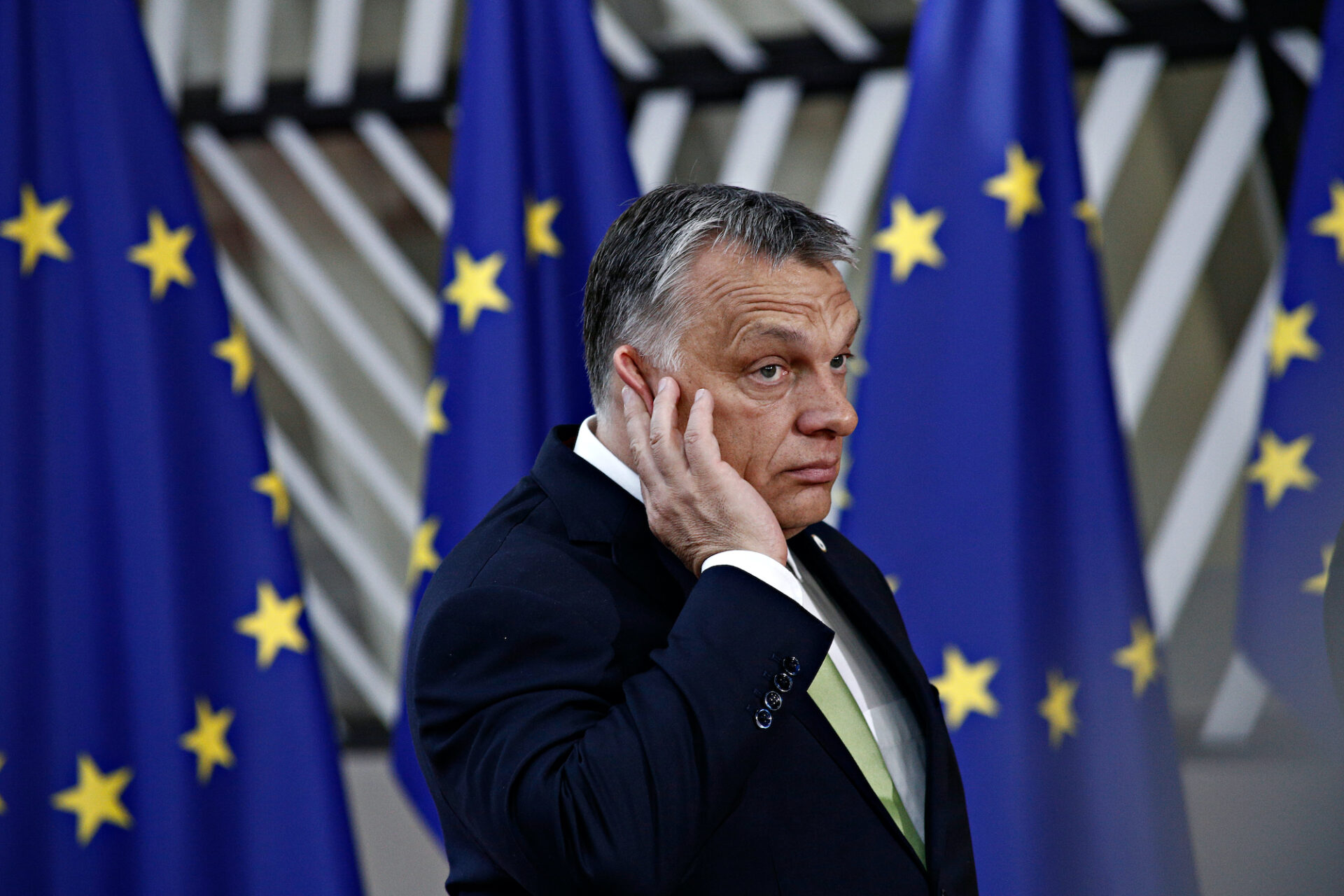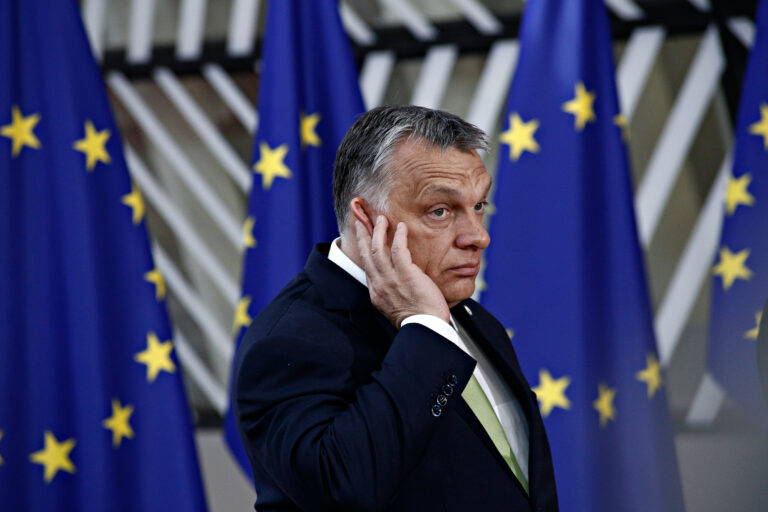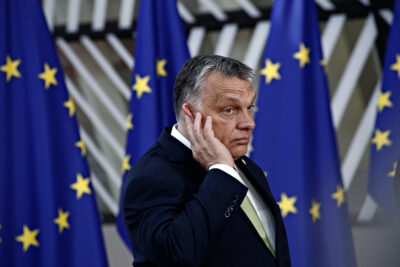by Sigrid Melchior and Attila Kálmán
In the clash between Brussels and Budapest, Hungary blinked first. It was a successful test for the so-called conditionality mechanism that is supposed to keep countries from straying from democratic principles. But still, there is little hope for real anti-corruption reforms under Viktor Orbán.
Even by EU standards, the 27 EU ambassadors’ Monday late evening mega-deal must break some kind of record, in terms of the importance and complexity of the issues at stake – not to mention the degree of horsetrading.
In exchange for Hungary dropping its national veto on a number of files – the most urgent being a massive aid package to war-torn Ukraine to keep the country afloat next year – the other EU countries gave a slight discount on the economic sanctions they wanted to inflict on Hungary.
The deal is full of details for EU nerds to unpick. But what really matters is this: all EU countries together decided to suspend EU funds going to Hungary. A total of 55% of the regional funds allocated to Hungary for the period 2021-2027 – money to build motorways or broadband lines, for example – will be held back.
This amounts to around €6.3 billion. The sum is lower than what the European Commission had previously recommended, which was 65%r of the regional funds, making Orbán’s pill a little less bitter to swallow.
But why only 55% or 65% of regional funds, legal purists might say, and not 100% of all EU funds? The conditionality mechanism is supposed to protect the EU budget against systemic risks, due to rule of law deficiencies. With political corruption rampant in today’s Hungary, and the judiciary under political control, all EU funds are, theoretically, at risk – and should be withheld, until necessary reforms are made.
But the conditionality mechanism was never really about protecting the EU budget. If it were, then there would also be talks of withholding funds from, say, Italy, where plenty of EU cash goes missing every year.
No, the conditionality mechanism is a political tool to force an EU country straying away from democracy, to come back in line. The EU budget is the carrot and the conditionality mechanism is a brand new stick.
The decision to withhold billions of euros from Hungary couldn’t have come at a much worse time for its economy. Monthly inflation in November topped 22%, and there are rumours the government is considering taking out foreign loans to help plug a reported budget deficit. Such talk will likely only amplify in the wake of Monday’s decision.
And while Orbán was prepared to keep burning his political capital in Brussels, seemingly ignorant of the conditionality mechanism stick, he has so far taken no serious steps towards introducing significant reforms to tackle systemic corruption domestically.
Yet it is the ailing economy that has led to months of protests by teachers and students over the poor state of education and low salaries. The head of the prime minister’s office, Gergely Gulyás, has said repeatedly that the government can only raise wages if blocked EU funds come through. After some of that funding arrived, Orbán’s first step was to raise pensions by 15%.
Gulyás said that teachers’ salaries might be raised in January, if all the funds are available. It was a show of control from the ruling party. They are not afraid of protests and they feel so confident in their power that they will even provoke the protesters with such a gesture. After Monday’s decision, though, those extra funds are unlikely to arrive. Orbán, however, may use that as political capital at home, and continue to point the finger at the EU if he claims that there is no money. Equally, if reforms are not made and funds are not freed, he can argue that Brussels is holding a kind of leash around the neck of the Hungarian government.
Undoubtedly, though, Monday’s decision is still historic. It was a test of the conditionality mechanism itself. It survived. And it can be used again.
There is now for the first time a tool and a blueprint for EU countries to deal with one of their own sliding into authoritarianism. Up until this Monday, it wasn’t clear that the EU governments would actually follow through on Hungary. There were too many other urgent decisions that required Hungary’s support.
Governments who might have been tempted to kick the can a bit further, were actually tied down by their national parliaments. In the last few weeks, the German Bundestag and the French National Assembly both voted in favor of blocking EU money to Hungary. National parliaments being conscious of and actually steering what their governments do in Brussels is a quiet rare sight.
The decision to freeze the funds to Hungary was taken unanimously, although it legally only required a qualified majority. In the end, not even Poland voted to support Orbán.
The relations between Hungary and the Visegrad countries – Czech Republic, Hungary, Poland, and Slovakia – have become more and more strained because of Orbán’s policies on Russia and Ukraine. Hungary gambling with the aid package to Ukraine might have been the last straw.
Other countries could also have tried to block the decision: those with high levels of corruption at home, such as Bulgaria and Romania, and who might at some point themselves might be confronted with the conditionality mechanism. But they too went along.
The success is owned to a large extent by the European Parliament. When the EU law was negotiated and finally adopted in late 2020, it pushed for a stronger tool, while EU governments in the Council wanted to weaken it. Once the EU law was in place, the parliament sued the European Commission to force it to actually trigger the mechanism.
And then, when the Commission finally did so, this autumn, and came under pressure from EU governments, some MEPs made it clear that the parliament could pass a motion of censure against Ursula von der Leyen if the commission would backtrack.
The European Parliament, as well as national parliaments, have helped – or threatened, depending on how you see it – the European Commission and the national governments to do the right thing.
What will happen now? The political mega deal marks the beginning, not the end. The money that Hungary stands to lose amounts to several points of Hungary’s GDP. Will Hungarians blame Orbán, whose friends and family have been enriched with EU funds over the years? Or will they blame Brussels for, in the words of Orbán, punishing a sovereign nation because of its migration or LGBT policies? The first chapter was written on Monday night, the next one is yet to be seen.







